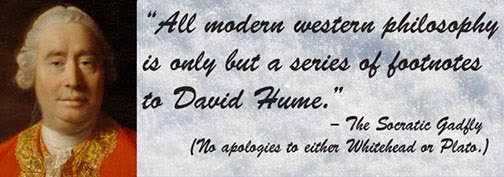Rather than have Gnu Atheists label (and as a pejorative, to boot) people like me as "accommodationist," to the degree I identify myself as an atheist at various times and in various venues and discussions, I thought, while not label myself, if a label is sometimes needed?
And, calling myself a "thoughtful atheist"? If you infer that I'm implying something about Gnu Atheists, well, there's nothing I can do about your inferences.
Now, the history. I believe that the history of atheist (in the western, naturalistic sense, not Theravada Buddhist sense) divisions can be traced back about 250 years to interactions between David Hume and the Baron D'Holbach during Hume's sojourn in France. (Wikipedia links for both.)
In its Hume entry, though I believe it overstates things a bit, we see this noted:
It is likely that Hume was skeptical both about religious belief (at least as demanded by the religious organisations of his time) and of the complete atheism promoted by such contemporaries as Baron d'Holbach. Russell (2008) suggests that perhaps Hume's position is best characterised by the term "irreligion". O'Connor (2001, p19) writes that Hume "did not believe in the God of standard theism. ... but he did not rule out all concepts of deity". Also, "ambiguity suited his purposes, and this creates difficulty in definitively pinning down his final position on religion".I would at least agree with Russell, but think that O'Connor overstates that. Beyond that, some recent scholarship argues that "A Treatise on Human Nature" was a carefully crafted, carefully couched/disguised argument for atheism.
Meanwhile, per his entry, even many of the French philosophes found d'Holbach too radical and too acerbic. Again, no further comment, but what others do with inferences, I can't control.
Beyond style, I think Hume found d'Holbach too black-and-white in his thinking in general, as well as being, per Dan Dennett, a bit of a "greedy reductionist." Were d'Holbach around today, we'd maybe accuse him of scientism. And d'Holbach probably would have called Hume, the most thoughtful of people, an "accommodationist."
Anyway, this "tension," if you will, is nothing new.
But, for those of us who are nuanced, who are thoughtful .. we have a secular "patron saint." Fittingly, of course, we recently marked the 300th anniversary of Hume's birth.
Celebrate. Be ... reasonable. But not rationalistic!

No comments:
Post a Comment